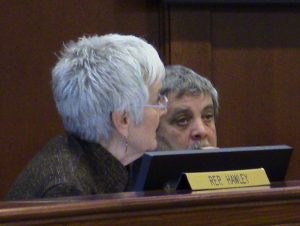House State Affairs was pretty full this morning, thanks to conservatives warring over whether or not to keep calling for an Article 5 convention to write a balanced budget amendment into the United States Constitution. After Republicans booted HJR 1003, seeking repeal of our standing convention call, those passionate patriots all left the room, leaving Rep. Tona Rozum (R-20/Mitchell) and me alone to debate HB 1007, the hoghoused measure to apply the Legislature’s single-subject restriction to initiated measures.

Rep. Rozum moved the surprise zombie-hoghouse last Tuesday that raised HB 1007 from the dead and rewrote it to screw one more plank to the Republicans’ wall against popular democracy. In her proponent testimony Rep. Rozum appeared to mistake the single-subject restriction for a limit on words or pages. She referred to the Anti-Corruption Act, good old IM 22, and its 36 pages as just too much for any voter to sort through. However, as we can see from HB 1070, a Legislative proposal can deal with a single subject—alcoholic beverages—and still run a hundred-plus sections and 18,000-plus words.
I countered that HB 1007 is completely unnecessary to filter out multi-subject bills. First, the single-subject rule is intended to keep legislators from sneaking wild, unrelated provisions into omnibus bills at the last-minute in a jam-packed Session when people might not notice them. That transparency is important, but initiatives already have great transparency: they are submitted for public review more than a year before the election, and once petitioned, they cannot be hoghoused or altered in any way, thus ensuring no sneaky business. In her rebuttal, Rep. Rozum responded that I had made her point, that voters need transparency, and that initiatives aren’t really available for the voters to read until the last minute before the election. (Ummm…. the Secretary of State’s website has had the text of all possible 2018 ballot questions up since last summer.)
Second, ballot questions sponsors don’t go bonkers with multi-subject initiatives. It’s hard enough rallying different groups into a coalition to back one simple measure; trying to herd cats into a coalition to back an omnibus initiative to raise the minimum wage to $15, ban abortion, and legalize hemp hasn’t happened and isn’t going to happen.
Third, even if it did, voters won’t fall for it. The more complicated the measure, the more likely South Dakota’s cautious conservative voters are to turn it down. Sure, the Anti-Corruption Act passed, but only with 52% of the vote. It tackled a single subject—government accountability—but with multiple tools—campaign finance reform, lobbyist regulations, ethics commission, public campaign finance reform—each of which gave a few more voters reason to vote it down. Had the Anti-Corruption Act done just campaign finance reform or the ethics commission, it would have passed in the 60s.
I had a fun constitutional double-bind point to make, but I’m sure Speaker Mickelson and everyone else on House State Affairs had already read it in my Sunday blog post, and Chairman Larry Rhoden was looking like he was going to reach for the panic button, so I settled for the above three points at the mic.
In committee discussion, Rep. Julie Bartling made the best point of the morning against hoghoused HB 1007. As written, HB 1007 fails to provide the relief for voters that Rep. Rozum intends. Rep. Rozum says HB 1007 clarifies the single-subject rule, but it really doesn’t. It offers no definition of “single subject” and no way to block multi-subject bills from the ballot. Only the courts can determine whether an initiative treats of a single subject, and a court will not decide that until an initiative has passed, after the election. HB 1007 puts a legal cloud over initiatives, but it doesn’t spare the voters from having to grapple with them on their ballots.
Rep. Spencer Hawley noted that HB 1007 was not among the recommendations of the Initiative & Referendum Task Force that worked hard all summer studying the issue. Rep. David Lust, who has signaled his resistance to his fellow Republicans’ war against the people’s right to legislate on other anti-I&R bills, also opposed HB 1007. But all of the other Republicans on House State Affairs approved the single-subject restriction and moved it to the House floor.
https://qz.com/1204892/corporate-donors-use-a-secret-online-network-to-work-with-republican-state-attorneys-on-policies-and-laws/?utm_source=&google_editors_picks=true
How about it, South Dakota? Are you allowing outside money interests to influence you?